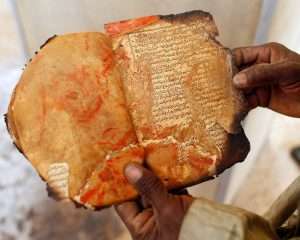Mali: Ancient manuscripts return to Timbuktu for analysis

According to Africa News via AP on November 17, staff at the Ahmed Baba Institute in Timbuktu, Mali, are scanning and photographing ancient manuscripts page by page, with some tests dating back hundreds of years.
The scripts contain knowledge that scholars now say exists nowhere else. Thirteen years ago, when al-Qaeda-connected fighters stormed into the city, staff and local families smuggled tens of thousands of manuscripts south to Bamako for safety.
However, the Malian capital itself is now facing pressure from jihadist groups. In September 2025, al-Qaeda affiliate Jama’at Nuraat al-Islam wal-Muslim (JNIM) imposed a fuel blockade on Bamako, causing a desperate fuel shortage with people queuing at gas stations.
JNIM’s motive for these blockades is to alienate residents and commercial organisations from the Mali’s ruling military junta. The group has also burned at least 100 tankers in Mali, according to a report that the Malian petroleum importers association published.

Amid the chaos and hardship in Bamako, most of the transcripts were digitised and have now been brought to their home in Timbuktu.
Dr Mohamed Diagayaté, the general director of the Ahmed Baba Institute, said, “You have a lot of historical information about the area, like the Macina region, Mopti and its surroundings and Timbuktu and its surroundings. So what we find in these ancient manuscripts cannot be found anywhere else.”
During the 2012 occupation when al-Qaeda took control of Timbuktu, many of the manuscripts were burned; however, some survived the fire damage and remaining legible.
The scripts covered many interesting topics, such as ancient scholars debating whether smoking tobacco was moral or if it should be prohibited.
In other scripts, officials urged a reduction in dowries is so that poorer men would stand a chance of getting married.
A founding member of SAVAMA DCI, Sane Chirfi Alpha, which is a local non-profit organisation that is dedicated to safeguarding and preserving the Timbuktu manuscripts, further detailed their content.
“According to old documents, there were doctors here in Timbuktu who performed surgery to treat cataracts. The same manuscript also says that the doctor from Timbuktu saved the French throne. The crown prince was sick, and French doctors could not cure him. It was the doctor from Timbuktu who cured him.”
Caretakers now say the priority is to secure this written record of West African history so future generations have access.
Africa News Via AP,Maghrebi.org
Want to chase the pulse of North Africa?
Subscribe to receive our FREE weekly PDF magazine













